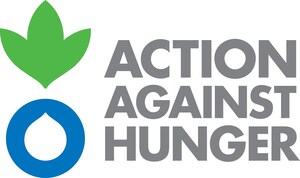NEW YORK, Sept. 2, 2021 /PRNewswire/ -- Action Against Hunger, a global nonprofit leader in the fight against malnutrition, today warned of alarming levels of food insecurity in Afghanistan and announced that it is resuming its programs as soon as possible, which had been temporarily suspended in recent weeks to ensure the safety of its aid workers.
More than half of the Afghan population – 18 million people – depend on humanitarian aid to survive, yet political instability has disrupted the delivery of food, water, healthcare, and other essential services. An estimated 12 million people in Afghanistan are facing a serious food insecurity crisis, and Action Against Hunger's latest nutrition surveys, carried out before the current crisis, indicate alarming rates of child malnutrition.
"The situation is critical. Chronic malnutrition rates of 30% are officially considered an emergency, and we are seeing rates of more than 45% in Ghor province," said Mike Bonke, Country Director for Afghanistan, Action Against Hunger. "With humanitarian aid and the financial system disrupted, an already difficult situation has gotten much worse. We are particularly concerned about rising hunger among vulnerable young children, pregnant women, and new mothers."
Prior to the current crisis, 3.1 million children across Afghanistan were suffering from malnutrition, a life-threatening condition that is preventable and treatable. Nearly half of the children younger than five are expected to suffer from acute malnutrition and need lifesaving treatment this year alone, according to the United Nations. Additionally, right now, more than 550,000 people have been displaced within the country, complicating the delivery of essential humanitarian services.
Action Against Hunger is resuming work as soon as possible in the Helmand, Ghor, Daykundi, and Badakhshan provinces. The non-religious, nonpartisan organization focuses on treating and preventing malnutrition, improving health through mobile clinics, promoting agricultural projects to strengthen food security, and implementing water, sanitation, and mental health programs.
"We must separate lifesaving aid from security and other foreign policy issues. We only seek access to respond to urgent humanitarian needs. This is where our principles of neutrality, impartiality, and independence are key," said Bonke. "Emergency funding is essential, and we must be able to get it into the country. Decades of conflict have left people unable to provide for themselves, a situation made more difficult by the impacts of COVID-19, climate stress and the economic chaos we are seeing now. We cannot forget the millions of women, men, and children who are facing alarming levels of need. We cannot abandon the people of Afghanistan."
Action Against Hunger was established in response to the humanitarian crisis in Afghanistan in 1979. More than 40 years later, it is one of the leading organizations working to help the country's most vulnerable people. Last year alone, Action Against Hunger provided direct aid to 190,543 people in the country.
About Action Against Hunger
Action Against Hunger is leading a global movement to end hunger in our lifetimes. It innovates solutions, advocates for change, and reaches 25 million people every year with proven hunger prevention and treatment programs. As a nonprofit that works across 50 countries, its 8,300 dedicated staff members partner with communities to address the root causes of hunger, including climate change, conflict, inequity, and emergencies. It strives to create a world free from hunger, for everyone, for good.
SOURCE Action Against Hunger

WANT YOUR COMPANY'S NEWS FEATURED ON PRNEWSWIRE.COM?
Newsrooms &
Influencers
Digital Media
Outlets
Journalists
Opted In






Share this article